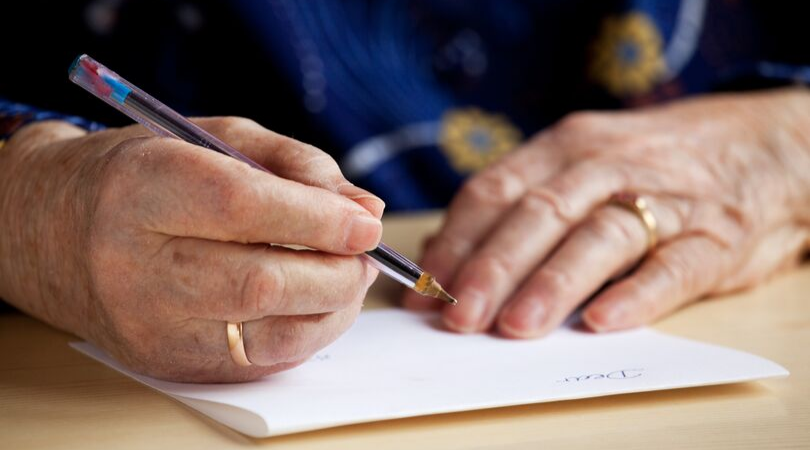Using Writing as Therapy at the End of Life

Graham Greene once said, “writing is a form of therapy; sometimes I wonder how all those who do not write, compose, or paint can manage to escape the madness, melancholia, the panic and fear which is inherent in a human situation.”
Is there any situation more prone to madness, melancholia, panic, and fear than when the end of life is approaching?
Whether it’s the person experiencing the illness or a loved one caring for them, a terminal diagnosis is emotionally devastating. Writing about our sadness, hope, and fear can be an extremely helpful tool to process these emotions. Using writing as therapy is a way to explore our feelings and to express ourselves without censorship. It can also be a way to share stories and important messages with the people we love.
Don’t be intimidated or think that writing should be left to the professionals. No one knows your experience and your feelings better than you. When writing through an illness or caregiving, focus on getting your thoughts on paper, not on commas and spelling errors. This is about sharing your story with yourself or with loved ones. Judgement has no place here.

Writing in a Journal as a Form of Therapy
If you’ve never kept a journal, the hardest part can be just getting started. A good way to begin using writing as therapy is by finding a book that appeals to you. It doesn’t need to be fancy Even a basic notebook will work, but finding a book in a color and style you like can make the initial task more enjoyable. A good pen helps, too!
Once you’ve selected the book, just start writing. Many people begin by talking about their activities. They chronicle the details of their day from morning until night, adding in their thoughts and questions along the way. Write about the things that made you happy and the worries you’re experiencing. Jot down ideas and flashes of inspiration. Share stories from the most important moments of your life or the most ordinary of days that now mean so much more.
While experts recommend writing in the morning, the most important thing when you’re using writing as a form of therapy is to find a regular time where you can sit quietly without interruption. That can be in the morning, before bed, or when everyone is out of the house running errands. Try to write everyday.
There are no rules to writing a journal. You can address your thoughts to yourself, to God, to a loved one or you can write as though you are sharing your life to a classroom of students. Work through some of the more difficult feelings in your journal so you’re not taking them out on loved ones. If this whole situation feels unfair, write about that. Write about your anger. Write about how sad you are to be slipping away or watching your loved one slip away.
This is your space to write whatever you wish. You can draw cartoons or record recipes if that’s what makes you happy.
If you want your loved ones to eventually read your journal, give them permission. You can also ask them to not read it and give them specific instructions on how to dispose of the journal. Trust your family to respect your wishes.

Writing Letters as a Form of Therapy
Writing letters is becoming a lost art, but it can be a powerful way to connect with loved ones. You can write letters to a sick relative that is too far away to visit. Share memories and express your love and support.
If you are the one who is ill, you can use letters as a way to ensure your loved ones will hear everything you have to say to them. Use the letters to share old stories, recipes, or just words of apology and love.
Letters can be sent by email, but there is something especially powerful about sending and receiving a handwritten letter. It is a way to address unfinished business and find a deeper emotional connection.
If your loved one is ill and wants to write letters, keep them well stocked with paper, cards, pens, and stamps. If they ask for a letter to be held until after their death, respect their wishes.

Writing Through Grief
If your loved one has already passed away, using writing as a form of therapy can be helpful as you work through your grief. Often, it feels like we’ve been left all alone in our pain after a loss. Friends and family may feel uncomfortable discussing your feelings. But the page lays blank before you, ready to hear your memories and accept your feelings of loss.
An important thing to remember is that while using writing as therapy is beneficial, it doesn’t replace professional support. Social workers and chaplains are ready to provide emotional and spiritual support to terminally ill patients and their loved ones.
Crossroads Hospice & Palliative Care also provides complementary Grief Recovery Groups in all the communities we serve. Grief Recovery Groups welcome individuals who have experienced any type of loss. Contact us at 1-888-564-3405 to speak with a Bereavement Coordinator about grief support services near you.
If you found this information helpful, please share it with your network and community.
Copyright © 2019 Crossroads Hospice & Palliative Care. All rights reserved.



